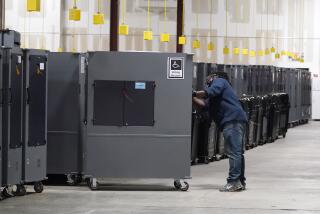Philippines Loses Bribery Suit Against Westinghouse : Energy: Charge of $26-million payoff for a nuclear power plant that has never operated is dismissed.
- Share via
NEWARK, N.J. — A civil jury cleared Westinghouse Electric Corp. on Tuesday of involvement in a bribery scheme during the building of a Philippine nuclear power plant.
The Philippine government had brought a civil suit charging that Westinghouse and the engineering firm Burns & Roe Associates had taken part in a $26-million bribery plot with former Philippines President Ferdinand Marcos to get the plant built in 1976.
Most of the counts in the suit had been dismissed by the judge, who ordered them sent to outside arbitration.
The trial had gone ahead on three remaining counts.
Lawyers for the Philippine government said they would appeal. The government said it was disappointed in the jury verdict.
Although completed, the 620-megawatt plant has not been allowed to operate by the Philippine government.
Philippine officials say the plant is shoddily built and is not safe to operate. It is located near an earthquake fault.
The Philippines is now facing an electric power shortage.
In a statement, Westinghouse said the verdict is consistent with earlier finds by the U.S. Department of Justice, the Securities and Exchange Commission and an International Court of Arbitration.
“All investigations have found no wrongdoing by Westinghouse,” the company said.
Westinghouse contended that the safety of the plant and quality of its construction have been affirmed by international experts selected by the Philippines themselves.
“The plant is a valuable asset, and it should be operated,” the statement said.
The Philippine government accused Pittsburgh-based Westinghouse and Oradell, N.J.-based Burns & Roe of funneling the money to Marcos and his business associate, Herminio Disini.
Both Westinghouse and Burns & Roe had denied the allegations, saying the money given to Disini was for legitimate sales commissions.
The case was heard in federal court in Newark before U.S. District Judge Dickenson DeBevoise.
The Philippine government argued that Marcos directed the Philippine National Power Corp. to enter into a contract with the two companies to design and build a power plant. The plant is located 60 miles northwest of Manila, on Luzon island.
More to Read
Inside the business of entertainment
The Wide Shot brings you news, analysis and insights on everything from streaming wars to production — and what it all means for the future.
You may occasionally receive promotional content from the Los Angeles Times.










